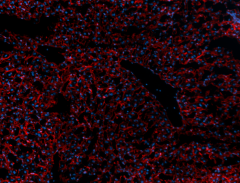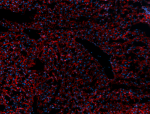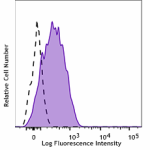- Clone
- AOB-1 (See other available formats)
- Regulatory Status
- RUO
- Other Names
- SCARB1, SR-BI
- Isotype
- Rat IgG2a, κ
- Ave. Rating
- Submit a Review
- Product Citations
- publications

-

C57BL/6 mouse frozen liver section was fixed with 4% paraformaldehyde (PFA) for 10 minutes at room temperature and blocked with 5% FBS for 30 minutes at room temperature. Then the section was stained with 10 µg/mL of purified anti-mouse CD36L (clone AOB-1) overnight at 4°C, followed by 2.5 µg/mL of anti-rat IgG (clone Poly4054) Alexa Fluor® 647 (red) for two hours at room temperature. Nuclei were counterstained with DAPI (blue). The image was captured by 10X objective. -

BALB/c mouse bone-marrow derived macrophages stained with purified anti-mouse CD36L (clone AOB-1) (filled histogram) or rat IgG2a, κ (open histogram) , followed by anti-rat IgG PE.
| Cat # | Size | Price | Quantity Check Availability | Save | ||
|---|---|---|---|---|---|---|
| 163102 | 100 µg | $347 | ||||
Scavenger receptor class B type I (SCARB1), also known as CD36L1, is a member of the scavenger receptor family. It is an integral membrane protein and function as HDL receptor expressed primarily in liver and nonplacental steroidogenic tissues, and mediates selective cholesterol uptake by a mechanism distinct from the classic LDL receptor pathway. Its primary function is facilitating reverse cholesterol transport by transferring cholesterol esters of high-density lipoproteins (HDLs) into the liver. This function serves to lower the risk of development of atherosclerosis. SCARB1 is also able to bind to other lipoproteins such as LDL, OxLDL, and VLDL. SCARB1 is also likely to be involved in pathogen recognition through its recognition of mycobacteria and other viral proteins and regulates vitamin E levels in the tissue.
Product DetailsProduct Details
- Verified Reactivity
- Mouse
- Antibody Type
- Monoclonal
- Host Species
- Rat
- Formulation
- Phosphate-buffered solution, pH 7.2, containing 0.09% sodium azide
- Preparation
- The antibody was purified by affinity chromatography.
- Concentration
- 0.5 mg/mL
- Storage & Handling
- The antibody solution should be stored undiluted between 2°C and 8°C.
- Application
-
IHC-F - Quality tested
FC - Verified
IP - Reported in the literature - Recommended Usage
-
Each lot of this antibody is quality control tested by immunohistochemical staining on frozen tissue sections. For immunohistochemistry, a concentration range of 5.0 - 10.0 µg/mL is suggested. For flow cytometric staining, the suggested use of this reagent is ≤ 0.5 µg per million cells in 100 µL volume. It is recommended that the reagent be titrated for optimal performance for each application.
-
Application References
(PubMed link indicates BioLegend citation) -
1. Tsugita M. et al. 2017. Cell Rep. 18:1298.
- RRID
-
AB_2892337 (BioLegend Cat. No. 163102)
Antigen Details
- Structure
- Integral membrane glycoprotein
- Distribution
-
Liver and nonplacental steroidogenic tissues
- Function
- Involved in the uptake of high density lipoproteins (HDL), phagocytosis of apoptotic cells, and pathogen recognition.
- Ligand/Receptor
- Phosphatidylserine, HDL, apoB-containing lipoproteins, LDL, vitamin E
- Cell Type
- Macrophages, Monocytes, Platelets
- Biology Area
- Cell Biology, Immunology
- Molecular Family
- CD Molecules
- Antigen References
-
- Acton S, et al. 1996. Science. 5248:518.
- Rigotti A, et al. 2003. Endocr Rev. 24:357.
- Valacchi G, et al. 2011. Ann N Y Acad Sci. 1229:E1-7.
- Scarselli E, et al. 2002. EMBO J. 21:5017.
- Mardones P, et al. 2002. J Nutr. 132:443.
- Gene ID
- 20778 View all products for this Gene ID
- UniProt
- View information about CD36L on UniProt.org
Related Pages & Pathways
Pages
Related FAQs
Other Formats
View All CD36L Reagents Request Custom Conjugation| Description | Clone | Applications |
|---|---|---|
| Purified anti-mouse CD36L | AOB-1 | IHC-F,FC,IP |
Compare Data Across All Formats
This data display is provided for general comparisons between formats.
Your actual data may vary due to variations in samples, target cells, instruments and their settings, staining conditions, and other factors.
If you need assistance with selecting the best format contact our expert technical support team.
 Login/Register
Login/Register 










Follow Us